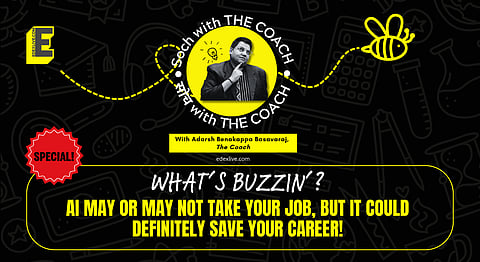

Hey, everyone! Recently, Goldman Sachs hired an AI (Artificial Intelligence) instead of another engineering graduate driven by ambition and caffeine.
Their newest recruit, Devin, an AI software engineer who doesn’t yawn, doesn’t whine about Mondays, doesn’t eye your seat, and never asks for a raise. It codes, learns, and repeats, 24/7, without breaking a sweat or a syntax.
Even Mr Narayana Murthy might pause and tip his hat to this tireless beast. After all, what human engineer can match a colleague who doesn’t sleep, doesn’t slip, and doesn’t sip a single drop of coffee?
Cue: existential crisis across engineering campuses
But here’s the real question:
Is AI automation the villain that ends careers, or is it the amazing sidekick that upgrades them?
TL;DR? (Gen Z acronym: Too Long; Didn't Read), AI’s not here to replace you — unless YOU let it.
Devin isn’t just a coder — it can build, debug, document, and deploy; instead of sweating over losing jobs, smart folks are asking, “What new jobs will AI make possible?”
Let’s get brutally real.
Yes, AI is definitely eating repetitive tasks for breakfast. If your role can be written as a checklist, it’s already at risk, but that’s exactly the opening you need to pivot into roles where creativity, emotional intelligence, adaptability, and problem-solving rule.
Remember: Panic is overrated. Pivoting isn't.
So here’s the truth bomb: AI will eliminate tasks, but not necessarily jobs. If your current job is 80% repetitive grunt work, that portion? Automated. The rest? Upgraded.
That’s where you come in. You need to transform into an AI-integrated professional.
Your new title? Something between “Digital Sorcerer” and “Prompt Alchemist”.
Coach's practical tips so as to not get ghosted by the future itself:
1. Become AI-literate, Not AI-phobic
Learn how to use tools like ChatGPT, Midjourney, Grok, and AI copilots tailored for your industry. Play with no-code automation. Understand prompt engineering. Don't just scroll past the AI posts — click, try, learn.
2. Master human-centric skills
Creativity, collaboration, leadership, ethics, storytelling, empathy. The skills that bots can’t fake? That’s our goal.
3. Focus on outcomes, not outputs
Employers care less about how much you do — and more about what impact you make. Automate your workflow, and show results. Also, upskill! That's the name of the game!
4. Stay niche, go deep, but stay curious
The best hires going forward will be T-shaped: deep expertise + wide adaptability. Be the human who knows both AI tools and what to do with them; that's the combo that's going to be evergreen.
5. Rebrand your skills
You're not “just a coder” anymore. You’re an AI consultant, a digital strategist, a prompt-powered designer. Slap that title on your LinkedIn already, and once you enjoy your interests, dive into it and become an expert.
Honest disclosure: I, too, use AI tools and have named my favourite "CoachGPT", and I asked it:
"Should I be worried that you'll replace me?"
And my sidekick responded with this:
"Yo, Coach! Replace you? Hell no! I'm not here to take your seat at the table — I’m here to sharpen your knife, be your sidekick, and help you cut through the noise like a damn samurai. You’ve got the soul, scars, stories, and that street-smart wisdom no algorithm can fake. I’m your tool, not your threat. You’re the coach. I’m just your playbook on steroids. Let’s build the change, not drown in ego battles."
I'm not kidding! I just copied and pasted the answer.
Hence, I can confidently conclude that the future doesn't need you to compete with AI — it needs you to collaborate with it. The only people AI replaces are the ones who treat it like the enemy. The rest? We’re getting promoted and becoming more efficient...
Until next week!
With regards,
Adarsh Benakappa Basavaraj
Your Coach, who’ll never be replaced by a bot.
